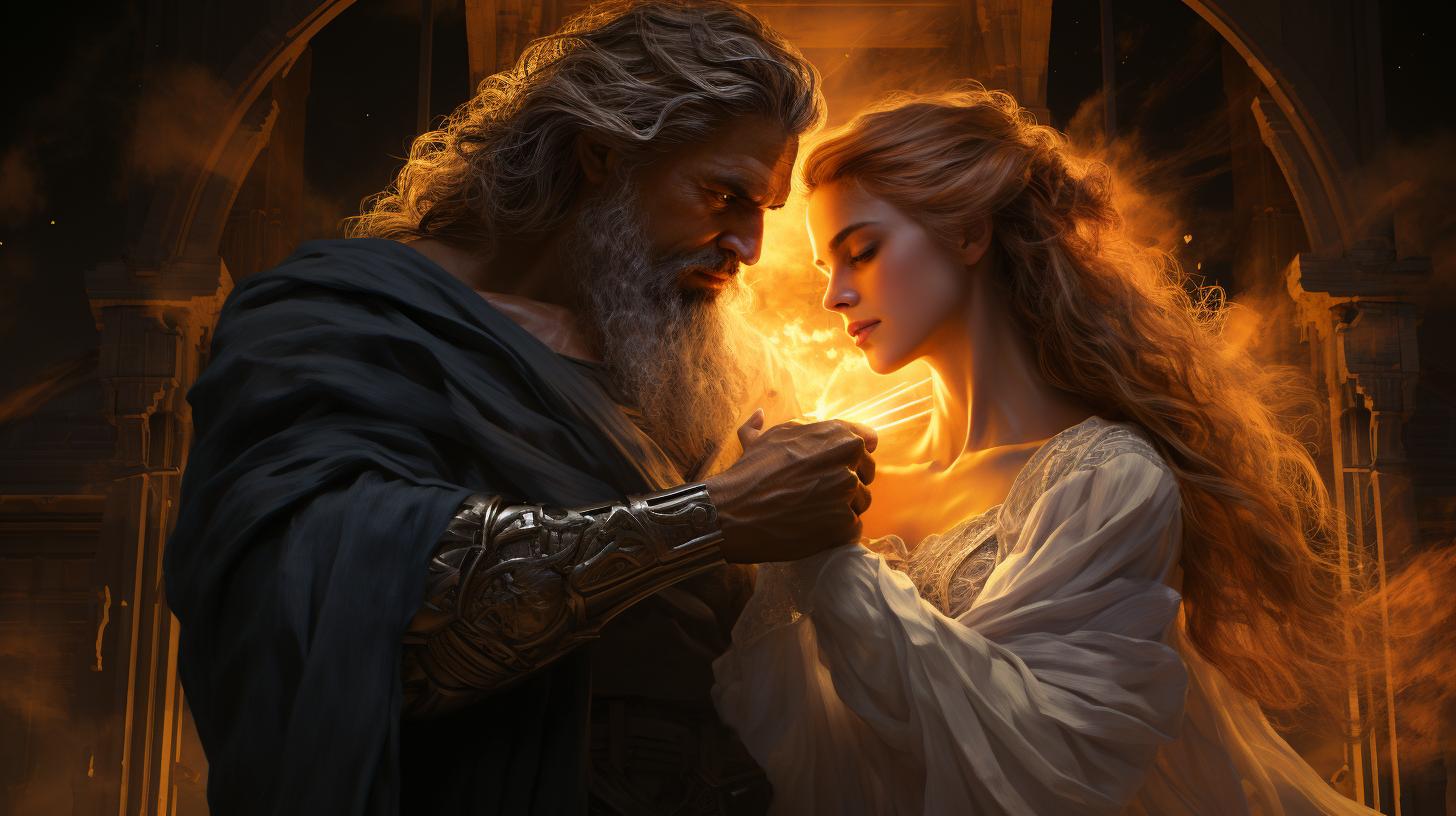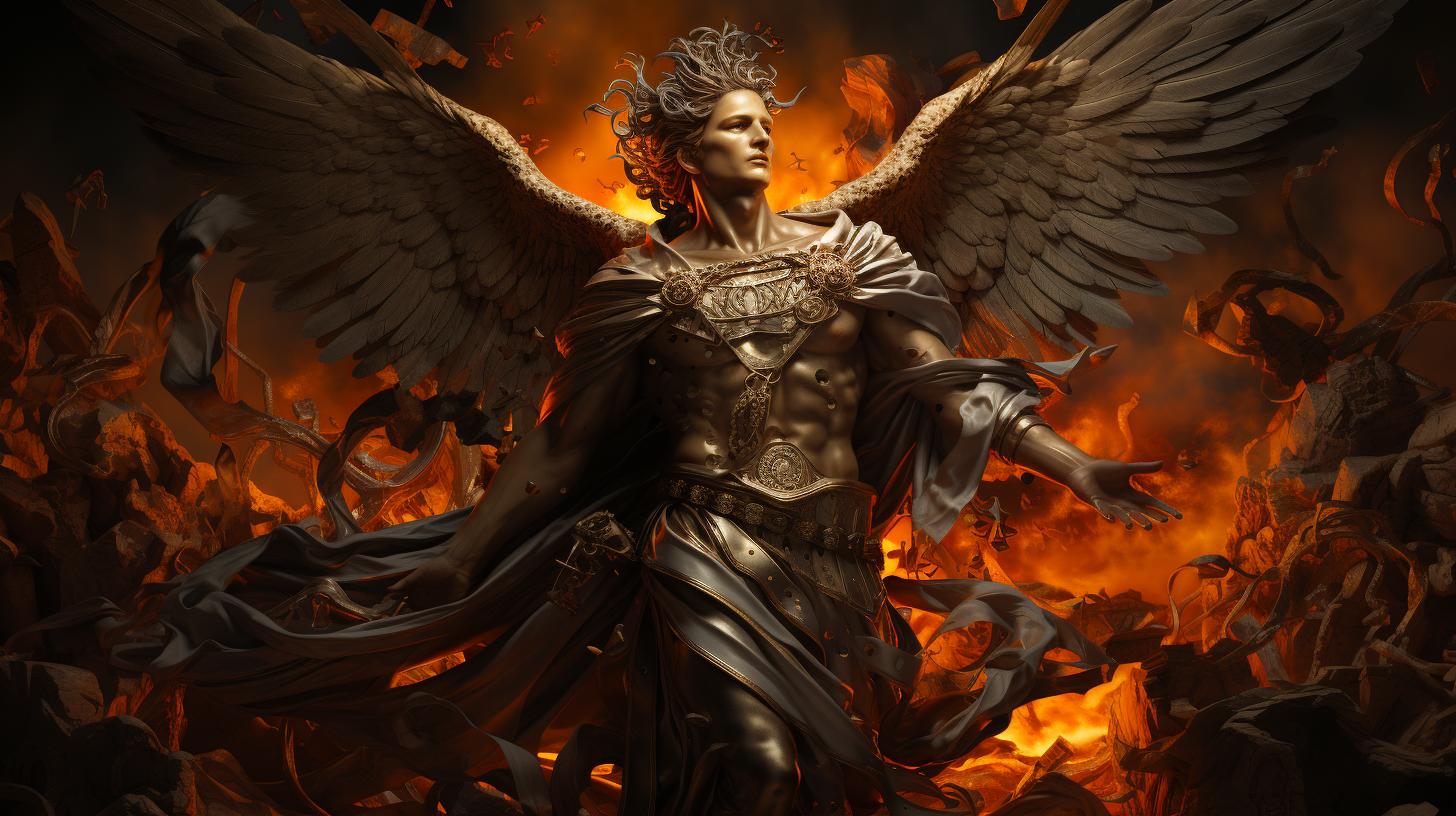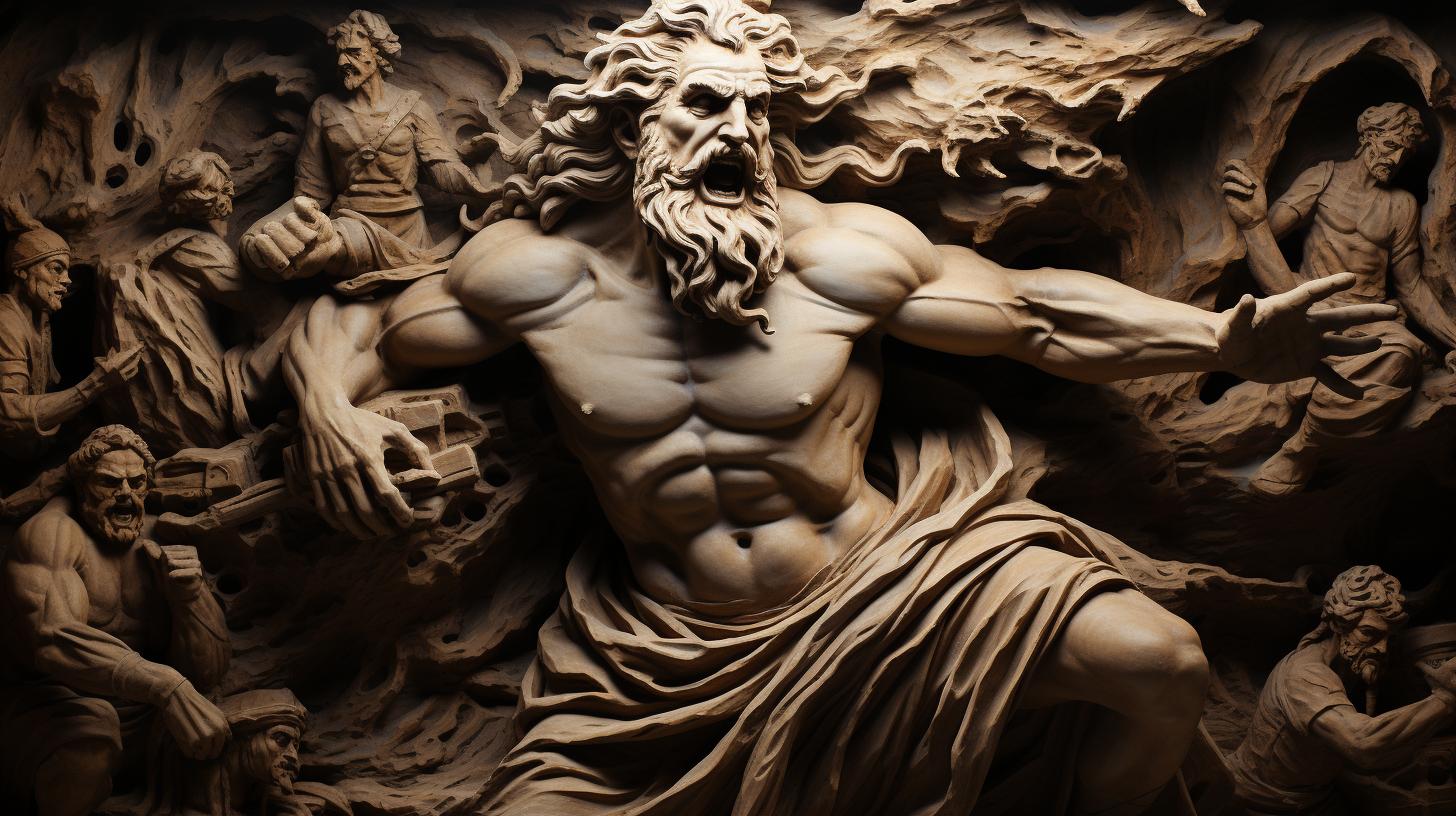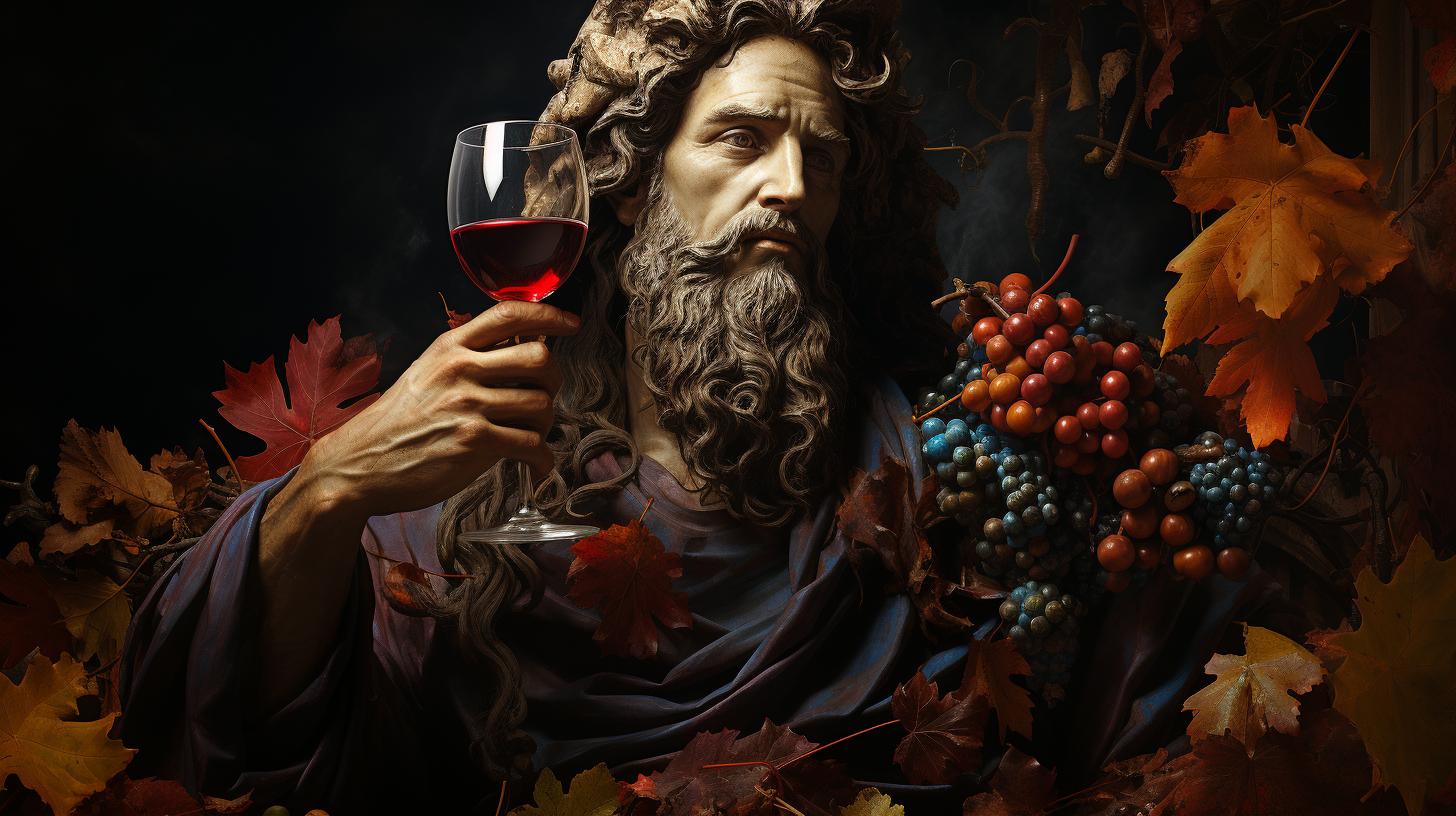Zeus And Hera Marriage: A Powerful Union of Gods

Zeus and Hera marriage is a prominent and powerful union in Greek mythology. Their relationship, rooted in power and politics rather than love, is characterized by infidelity, jealousy, and vengeance.
Despite these challenges, their marriage produced notable divine offspring. Zeus, as the king of the gods, chose Hera as his wife, despite her being his sister. Together, they represent the ultimate authority among the gods and their marriage holds a significant impact in Greek mythology.
Today, we explore the captivating story of Zeus and Hera’s union. Stay tuned for an in-depth analysis of their mythological journey.
The Story of Zeus and Hera
The mythological couple of Zeus and Hera holds a significant place in Greek mythology.
Their story, filled with intrigue and drama, unveils a complex relationship embedded in power dynamics and divine politics.
Zeus and Hera: A Mythological Couple
Zeus, the mighty king of the gods, and Hera, his sister, were brought together in a union that transcended the boundaries of mere mortal love. Their marriage was not forged out of affection, but rather as a means to establish power and political alliances among the gods.
The Marriage of Zeus and Hera
The matrimonial bond between Zeus and Hera originated from Zeus’ decision to choose Hera as his wife, despite her being his sister. The wedding ceremony, held in the mythical Garden of the Hesperides, witnessed a glorious night that spanned an incredible 300 years.
The Nature of Their Relationship
However, the union between Zeus and Hera was far from harmonious. Zeus, known for his numerous affairs with both mortal women and goddesses, constantly tested Hera’s patience, evoking her wrath and fueling her jealousy.
Despite the challenges they faced, their marriage endured, each holding their own position of power and authority within the divine hierarchy.
Hera: The Queen of the Gods
Hera, known as the Queen of the Gods in Greek mythology, plays a significant role in the pantheon. She is the wife and sister of Zeus, the king of the gods.
As the goddess of marriage and childbirth, Hera is associated with women’s roles and the sacred institution of marriage.
Hera’s Role in Greek Mythology
Hera’s role in Greek mythology extends beyond her position as Zeus’ wife. She represents the idealized image of a married woman, the epitome of loyalty and devotion. As the protector of married women, Hera presides over the marriages of mortal couples and blesses them with fertility and domestic harmony.
She embodies the sanctity and societal importance placed on marital unions in ancient Greece.
Hera’s Jealousy and Vengeance
Hera’s most well-known characteristic is her jealousy, particularly towards Zeus’ numerous affairs and illegitimate children. Her anger and vengeful nature are directed not only towards Zeus’ lovers but also towards their offspring.
She takes pleasure in tormenting and punishing these individuals, ensuring that they suffer the consequences of their actions.
Hera’s Children and Family
Hera and Zeus’ union resulted in the birth of several prominent deities. Together, they are the parents of Hephaestus, the god of fire and craftsmanship, and Ares, the god of war.
They also have children like Eileithyia, the goddess of childbirth, and Hebe, the goddess of youth. Despite her own maternal instincts, Hera’s vengeful nature often affects her relationship with her children.
Hera’s familial connections extend beyond her immediate offspring. She is the sister of Zeus, as well as the daughter of Cronus and Rhea. Hera’s lineage and position as the queen of the gods solidify her authority and power within the divine hierarchy.
Zeus: The King of the Gods
Zeus, the powerful ruler of Mount Olympus, holds the title of the king of the gods in Greek mythology. Let’s explore different aspects of Zeus’ character and his role in the divine hierarchy.
Zeus’ Infidelity and Affairs
Zeus is notorious for his numerous infidelities and affairs, which often involve mortal women. His charm and irresistible nature attracted many, leading to a string of relationships outside his marriage to Hera.
He pursued these affairs despite knowing the potential consequences and repercussions from his jealous wife, Hera. These affairs resulted in the birth of several demigods and other mythical beings throughout Greek mythology.
Zeus’ Children and Lineage
Zeus’ extensive lineage is filled with offspring from both his marriage to Hera and his affairs with various women. Many of these children played important roles in Greek mythology.
Among his famous offspring are Ares, the god of war, Athena, the goddess of wisdom, Apollo, the god of light and music, Artemis, the goddess of the hunt, Hermes, the messenger god, and Dionysus, the god of wine.
Zeus’ children played significant roles in various myths and legends, often wielding immense power and abilities inherited from their divine father.
Zeus’ Relationship with Hera
The relationship between Zeus and Hera was complex and tumultuous. Although Zeus chose Hera as his wife, their marriage was filled with tensions, primarily due to Zeus’ constant infidelity.
Hera, being the queen of the gods, despised Zeus’ affairs and sought revenge against his mortal lovers and their offspring. This continuous conflict between Zeus’ indiscretions and Hera’s vengeful nature created a strained dynamic within their relationship.
Despite the difficulties they faced, Zeus and Hera were bound by their roles as king and queen of the gods, representing the pinnacle of authority in Greek mythology.
Zeus’ relationship with Hera played a significant role in shaping the dynamics of the divine hierarchy and influencing various myths and legends.
The Impact of Zeus and Hera’s Marriage
The marriage of Zeus and Hera had a profound influence on Greek mythology, shaping various aspects of the divine world and human existence.
This section explores the significance of their union, the symbolism it embodied, and the lasting legacy it left behind.
The Influence of Zeus and Hera in Greek Mythology
Zeus and Hera’s marriage played a pivotal role in Greek mythology, as they were considered the most authoritative and powerful couple among the gods. Their union represented the foundation of divine order and governance.
Zeus, as the king of the gods, embodied supreme authority, while Hera, as his queen, symbolized marital fidelity and the sanctity of marriage.
As the divine couple, Zeus and Hera oversaw various domains and aspects of life, including marriage, childbirth, and familial relations.
Their influence extended beyond the divine realm, permeating mortal society and shaping societal norms and values.
The Symbolism of their Union
The marriage of Zeus and Hera symbolized the interconnectedness of power, politics, and relationships. Their union demonstrated how marriages in ancient Greek society often served as power alliances between individuals and families.
It reflected the complex dynamics of marriage, where love and personal choice were often secondary to considerations of status, lineage, and strategic alliances.
Additionally, Hera’s role as the goddess of marriage represented the importance of marital fidelity, while Zeus’ infidelity highlighted the challenges and complexities of maintaining harmony within a marriage.
The symbolism of their union highlighted the tensions and contradictions inherent in the institution of marriage.
The Legacy of Zeus and Hera’s Marriage
Zeus and Hera’s marriage left a lasting impact on Greek mythology and cultural narratives. Their troubled relationship served as a cautionary tale, illustrating the consequences of infidelity, jealousy, and revenge within marriages.
Their mythical conflicts and divine interventions depicted the potential perils of straying from the boundaries of marital commitments.
Furthermore, Zeus and Hera’s children and descendants played significant roles in Greek mythology, shaping epic narratives, heroic quests, and legendary lineages.
The prophecies, conflicts, and adventures associated with their offspring added depth and complexity to the wider mythological fabric.
The legacy of Zeus and Hera’s marriage continues to resonate in modern interpretations of mythology and literature, highlighting enduring themes such as power dynamics, marital fidelity, and the complexities of human relationships.
The Role of Marriage and Motherhood in Greek Mythology
The realm of Greek mythology offers valuable insights into the role of marriage and motherhood. Within this ancient society, marriage was not always based on love, but rather served as a strategic power play.
It was a means for individuals, especially women, to gain status and forge alliances between families or even kingdoms.
Marriage as a Power Play in Greek Mythology
In Greek mythology, marriage was often a transaction arranged by families or political entities, with little consideration for the personal desires or emotions of the individuals involved. It served as a tool for consolidating power, advancing political agendas, and securing alliances.
For women, marriage was a critical aspect of their social and economic standing, determining their roles within society and their access to resources.
Within the context of Zeus and Hera’s marriage, their union exemplifies the political nature of these pairings.
Zeus, as the king of the gods, selected Hera as his wife not out of affection, but to solidify his dominion and establish her as the queen. This type of arranged marriage mirrored the practices and motivations of mortal marriages within Greek society.
Motherhood and the Status of Women
Motherhood held immense significance in Greek mythology, as it was believed to carry divine lineage and shape the fates of both mortals and gods. Women’s status and worth were often tied to their ability to bear children, particularly male heirs.
Upon becoming mothers, women gained a elevated position within their families and communities, as their role was seen as essential for the continuation of lineage and the perpetuation of the gods’ favor.
In the case of Zeus and Hera, their children represented symbols of power and influence. Hera, as the mother of Ares, the god of war, and Hebe, the goddess of youth, possessed a unique role within the pantheon as the mother of notable deities.
This elevated her status and solidified her place as the queen of the gods.
Hera and the Goddesses of Marriage and Childbirth
- Hestia: The goddess of the hearth, family, and domestic life.
- Aphrodite: The goddess of love, beauty, and desire.
- Demeter: The goddess of grain, agriculture, and fertility.
These goddesses, along with Hera, were closely associated with marriage and childbirth, and they oversaw different aspects of domestic life.
They personified ideals and virtues related to women’s roles within the household and the importance of sustaining harmonious unions.
In conclusion, marriage and motherhood played significant roles in Greek mythology.
Marriage served as a means to consolidate power and forge alliances, while motherhood brought elevated status and divine importance to women. Hera, alongside other goddesses, represented the idealized versions of wives and mothers, emphasizing the societal expectations surrounding these roles.
Understanding the dynamics of marriage and motherhood in Greek mythology provides valuable insights into the social structures and beliefs of ancient Greek society.
The Presence of Zeus and Hera in Greek Epics and Literature
The mythical figures of Zeus and Hera have a significant presence in Greek epics and literature.
They are portrayed in various works of renowned authors, adding depth and complexity to their characters and their relationship. Let’s explore how Zeus and Hera are depicted in some of the most influential Greek epic poems, as well as in the works of famous poets and playwrights.
Zeus and Hera in Homer’s Iliad and Odyssey
In Homer’s epic poems, the Iliad and the Odyssey, Zeus and Hera both play significant roles. Zeus, as the supreme ruler of the gods, frequently intervenes in the affairs of mortals during the Trojan War described in the Iliad.
He sometimes supports the Greeks and sometimes favors the Trojans, causing tension and conflict among the gods on Mount Olympus. Hera, as his wife, often aids the Greeks and uses her influence to support their cause.
Her actions are driven by her desire to protect her favorites.
One memorable instance in the Iliad is when Hera seduces Zeus to distract him from the battle, allowing the Greek hero Diomedes to gain an advantage over the Trojans.
In the Odyssey, Hera’s role is less prominent, but her presence is felt through her influence on Zeus and her support for the Greek hero Odysseus.
Zeus and Hera in Hesiod’s Works and Days
Hesiod, a Greek poet, depicts Zeus and Hera in his famous work, Works and Days.
While the main focus of the poem is on the ethical conduct of mortals, Hesiod includes references to the divine couple. Zeus is portrayed as a god who punishes those who act unjustly, while Hera is depicted as a goddess who watches over marriages and protects the sanctity of the union.
Hesiod emphasizes the importance of honoring Zeus and Hera to achieve a harmonious and prosperous life.
Zeus and Hera in Greek Tragedies and Comedies
Zeus and Hera also make appearances in Greek tragedies and comedies. Playwrights like Euripides and Aristophanes often drew inspiration from Greek mythology and incorporated the stories of Zeus and Hera into their plays.
In tragedies, Zeus and Hera’s tumultuous relationship is often explored, highlighting themes of power, jealousy, and the consequences of human or divine defiance. Comedies, on the other hand, sometimes presented the divine couple in a more lighthearted and humorous manner, showcasing their quirks and foibles.
Overall, the presence of Zeus and Hera in Greek epics and literature adds depth and intrigue to their mythological narrative. Their interactions and dynamics influence the events of epic poems and provide insight into the complexities of human and divine relationships.
.




















